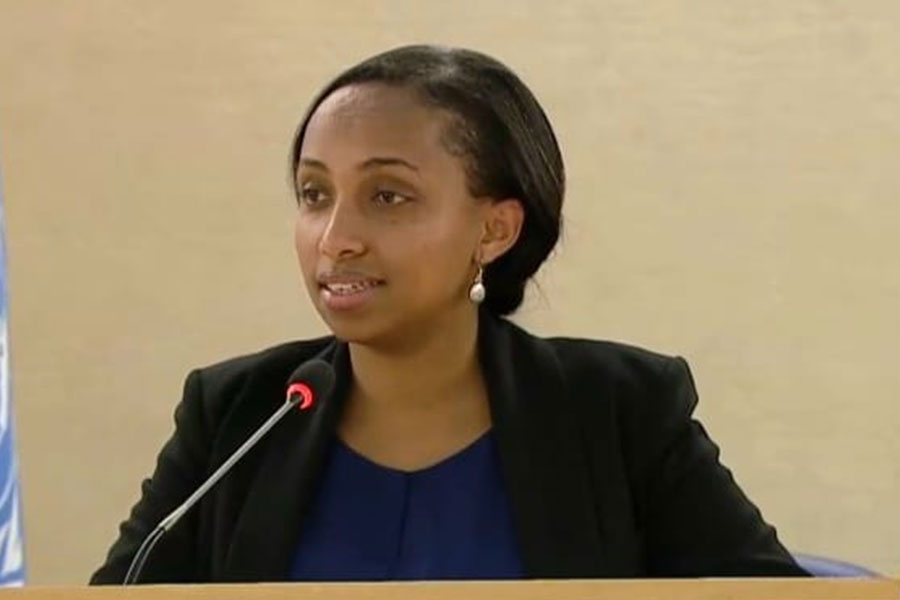
My Opinion | 128117 Views | Aug 14,2021
Apr 6 , 2025
By William Moore
The global need for effective malnutrition interventions is urgent, as evidenced by the link to millions of child deaths annually. Solutions such as prenatal vitamins and breastfeeding support are proven to save lives, yet remain underfunded. Governments should not necessarily increase spending, but redirect funds towards high-impact, evidence-based solutions. In this commentary provided by Project Syndicate (PS), William Moore, CEO of the Eleanor Crook Foundation and chair of Stronger Foundations for Nutrition, argues that these targeted investments could prevent numerous avoidable deaths even during financial constraints.
Philanthropy will never replace public aid, but it can be a powerhouse if we use it right. With global development funding under strain, European aid budgets being redirected toward defense and rearmament, and the United States (US) rethinking foreign assistance altogether, the aid community has been left scrambling.
So far, the reactions have been of two kinds: calls for philanthropy to fill the gap and moralising statements shaming governments for stepping back. Unfortunately, the first is unrealistic, and the second is ineffective. Private donors cannot solve systemic global challenges alone, and telling politicians that they are morally bankrupt generally does not bring them around to our side. Instead, we need to meet policymakers where they are, sharpen our arguments, and focus on what actually works.

The hard truth is that most government aid is not even designed for effectiveness, because it prioritises processes over results. Nor has philanthropy been immune to this impulse.
In our early years at the Eleanor Crook Foundation, we funded holistic, multisectoral programs that tried to tackle all causes of malnutrition simultaneously. But the results were underwhelming. The approach looked good on paper, but produced no measurable improvements in malnutrition. We learned from that failure and changed course. Now, we direct our funding where the evidence is strongest and the results most immediate.
At the recent Nutrition for Growth (N4G) Summit in Paris, we announced a 50 million dollar commitment, alongside 200 million dollars from other donors, to scale up one of the most cost-effective interventions in global health: prenatal vitamins, known as multiple micronutrient supplements (MMS). This funding will go toward a one-billion-dollar roadmap to ensure access to MMS for pregnant women no matter where they live.
The science on this issue is unequivocal. This supplement replaces the outdated iron and folic acid (IFA) tablets that are still given to many pregnant women in low-income countries. With MMS, women receive 15 nutrients, instead of two, leading to a dramatic reduction in maternal anemia, stillbirth, and low birth weight. The estimated economic returns are substantial – 37 dollars for every one dollar invested – and the human returns even more so, with infant mortality reduced by nearly one-third.
Global inequities in maternal health are profound. In London, a pregnant woman routinely has access to comprehensive prenatal vitamins. In Lagos, she might receive IFA or nothing at all. The difference reflects a gap in will, not knowledge. Ending such disparities does not require a scientific breakthrough but a greater investment in already proven solutions.
Over two decades of research, three Lancet studies, and multiple World Bank investment cases have identified roughly 10 nutrition interventions that are consistently underfunded despite their proven efficacy. These are not flashy, multisector, utopian initiatives. They are targeted, evidence-based programs that can be implemented immediately, at scale, to deliver measurable results.
Solutions like breastfeeding support, Vitamin A supplementation, prenatal vitamins, and ready-to-use foods for severely malnourished children belong to a package of interventions that, if scaled up in nine high-burden countries, could save at least two million lives over five years. Such life-changing results would cost 887 million dollars annually.
Malnutrition is now the leading driver of child mortality globally, contributing to some three million deaths in 2023 alone. These are not mysterious tragedies. They are predictable and, in many cases, cost little to prevent. In a world that routinely sends tourists to space, we obviously can afford to ensure that all pregnant women have access to a two-dollar bottle of vitamins.

This year's N4G Summit may be the last of its kind. It was part of a summit series linked to the Olympics, which will next be hosted by the US. With the current US administration already signalling that it will not continue the tradition, the recent commitments made in Paris have gained new urgency. Vague pledges and political posturing will no longer do.
At the Eleanor Crook Foundation, we are not asking governments to spend like they used to. Rather, we are urging them to look at the evidence and use their remaining budgets for official development assistance to scale up proven, cost-effective solutions. A modest investment in MMS, representing less than the cost of one week of G7 countries' defense spending, could save 600,000 lives.
Even with constrained budgets, we can save millions of lives. But only if we stop trying to do everything, and focus instead on what is the right thing to do.
PUBLISHED ON
Apr 06, 2025 [ VOL
26 , NO
1301]


My Opinion | 128117 Views | Aug 14,2021

My Opinion | 124342 Views | Aug 21,2021

My Opinion | 122447 Views | Sep 10,2021

My Opinion | 120297 Views | Aug 07,2021

Dec 22 , 2024 . By TIZITA SHEWAFERAW
Charged with transforming colossal state-owned enterprises into modern and competitiv...

Aug 18 , 2024 . By AKSAH ITALO
Although predictable Yonas Zerihun's job in the ride-hailing service is not immune to...

Jul 28 , 2024 . By TIZITA SHEWAFERAW
Unhabitual, perhaps too many, Samuel Gebreyohannes, 38, used to occasionally enjoy a couple of beers at breakfast. However, he recently swit...

Jul 13 , 2024 . By AKSAH ITALO
Investors who rely on tractors, trucks, and field vehicles for commuting, transporting commodities, and f...

Apr 26 , 2025
Benjamin Franklin famously quipped that “nothing is certain but death and taxes.�...

Apr 20 , 2025
Mufariat Kamil, the minister of Labour & Skills, recently told Parliament that he...

Apr 13 , 2025
The federal government will soon require one year of national service from university...

Apr 6 , 2025
Last week, the International Finance Corporation (IFC), part of the World Bank Group...

Apr 28 , 2025 . By NAHOM AYELE
Key Takeaways: The Ministry of Justice's directive plans to enforce pro bono wor...

Apr 26 , 2025
Neway Magersa (Left), president of Sinqee Bank, shared a lighter moment at the Skylight Hotel on Africa Avenue and chuckled with Oromia Regi...

Apr 27 , 2025 . By BEZAWIT HULUAGER
A controversial decision to clear a large tract of land in Addis Abeba's Wereda 1, around Flamingo and th...

Apr 27 , 2025 . By AKSAH ITALO
Key Takeaways A federal court dismissed Zewdinesh Getahun's ownership claim as time-barred, requir...